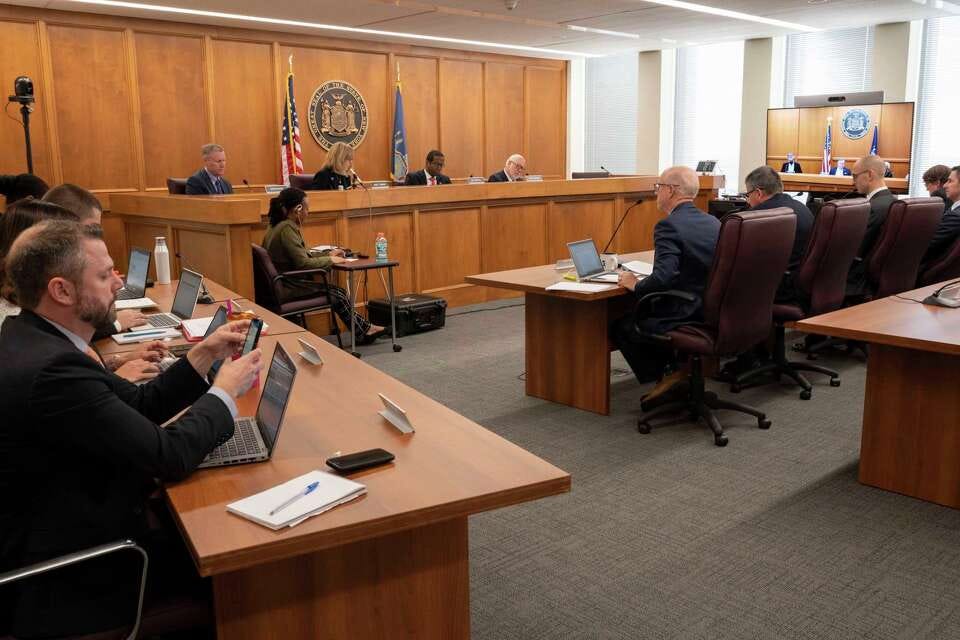New York's utility regulator on defense after clearing rate hikes
Hochul says 'not enough' is being done to contain costs for ratepayers.
Good afternoon — it’s Thursday and Creamsicle Day.
In today’s CapCon:
New York’s utility regulator approved new rate hikes for millions of New Yorkers Thursday. Here’s what that means.
No one is happy about the rate hikes, including Gov. Kathy Hochul, who said more needs to be done to contain costs.
The regulator, the Public Service Commission, defended the rate hikes and called on policymakers to help prevent larger increases.
New York’s corrections department is proposing new, expanded rules for when parole is considered for minor offenders serving life in prison.
New parents on public assistance could soon get a big check from the state.
Names in today’s CapCon: Kathy Hochul, Rory Christian, John Maggiore, Rob Ortt
⚡ Hochul says ‘not enough’ done to contain utility costs as PSC approves rate hikes
Energy bills will rise over the next three years for millions of New Yorkers after the state Public Service Commission approved an agreement with two utility companies Thursday.
There’s a silver lining to that news. That agreement will raise rates over a slower timeline than the one-year period the companies had requested. Those are National Grid and Central Hudson.
That means ratepayers will see a smaller increase in the first year but will still pay more over time. The first increase takes effect in September.
National Grid had requested a rate increase to produce $509.6 million in new revenue from electricity and $156.5 million from gas service over one year.
The final agreement will instead produce $708.1 million in new revenue from electricity and $193.7 million from gas service over three years. That’s apparently a good outcome, at least according to Rory Christian, the chair of the Public Service Commission.
“We know that we have achieved a good outcome when we ensure all participating parties are heard and we can reach a compromise,” Christian said.
That’s how rate increases for electricity and gas are decided in New York. They can’t charge whatever they want. Their rates have to be approved by the commission.
The state Department of Public Service then negotiates that request with the utility company until they can reach an agreement in the form of a settlement. The commission then approves that settlement. That’s what happened Thursday.
The rates approved for Central Hudson show similar math to what was allowed for National Grid. Central Hudson had requested a one-year increase of $47.2 million in revenue from electricity and $15.3 million from gas service.
The agreement will instead allow them to raise $95.8 million in new revenue from electricity and $47.9 million from gas service over three years.
The average National Grid bill will rise about $22 in the first year. I didn’t catch the dollar amount, but the average Central Hudson electricity bill will increase 3.47% in the first year. The average gas bill from the utility will increase 5.3% in the first year.
The new revenue will be used to maintain the energy infrastructure managed by the utilities and to continue the widespread electrification of that system while the state continues its shift toward more renewable energy sources.
But both Central Hudson and National Grid will also be allowed to earn a 9.5% return on equity, which is a weird calculation that essentially refers to their profit.
“Utilities are entitled to recover their legally and prudently incurred costs and their shareholders are entitled to a fair return comparable to industry standards,” Christian said.
I don’t know anyone who’s happy with the cost of energy and the state’s practice of regulating it.
But I know at least a few people who are not happy, including Gov. Kathy Hochul.
🗣️ Hochul places pressure on utility companies amid rate hikes
Hochul was asked about the rate hikes at an event in Schenectady Thursday and initially framed the outcome as a win because of how much lower the first-year costs will be for ratepayers.
She took a different tone in a statement released shortly after that event. I usually don’t share the whole statement, but I will this time.
Keep reading with a 7-day free trial
Subscribe to Capitol Confidential with Dan Clark to keep reading this post and get 7 days of free access to the full post archives.




